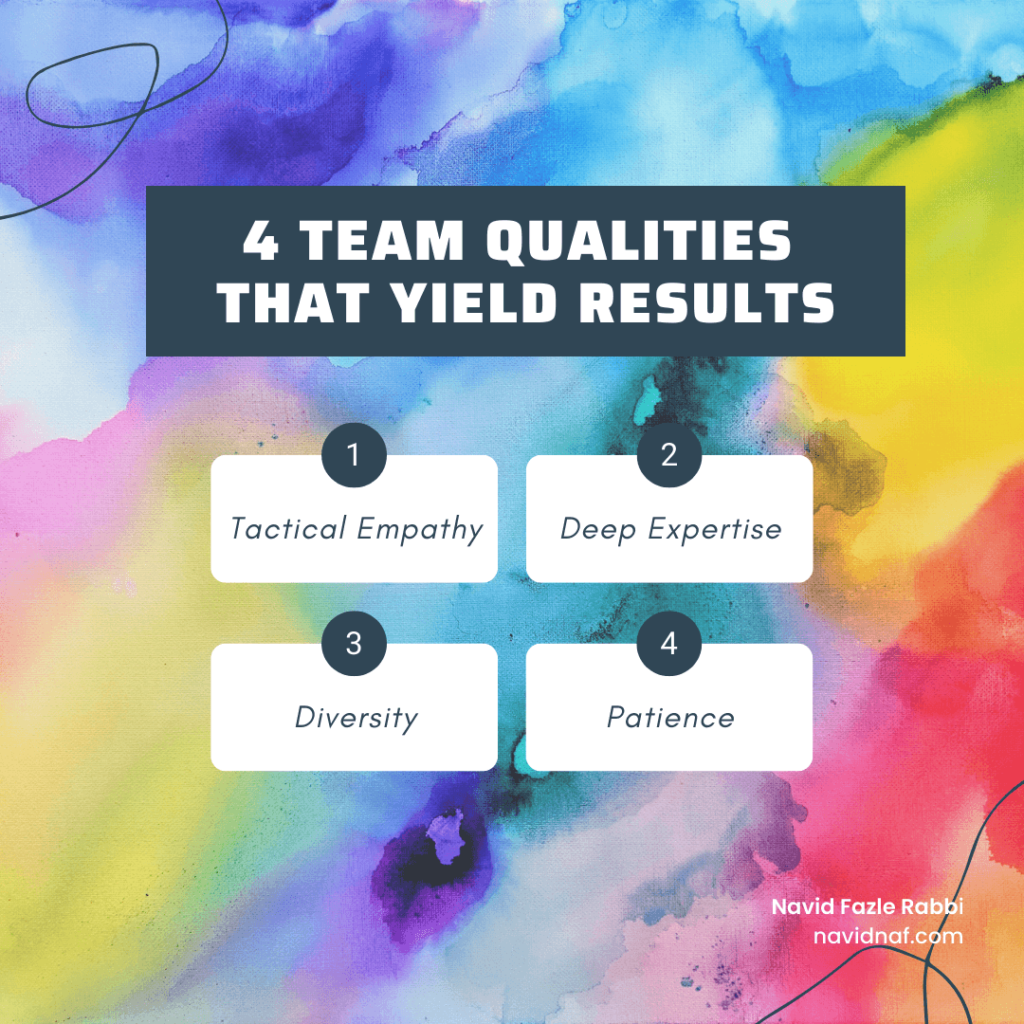
Diplomacy 101
Four Team Qualities that Yield Results

Tactical Empathy
Try to think like your coworkers and put yourself in their shoes. Ask them what their goals, fears, and wants are. We should think about strategic grandiosity when we know how our counterpart is going to think. Set up a way of thinking that is diplomatic.
We should think about what dramatic move we should make to put pressure on the other side and get what we want. And to get what we want, we need to use some signs of our own side’s strength and take a chance with our own strength.
Deep Expertise
Diplomacy is very helpful because it lets people talk about what happened. History can be the negotiators’ most underrated and useful tool. Pressure to the area’s pressure point.
Will you have a critical mass of core experts who know what your counterpart is doing and why?
Knowing the context, figuring out what it means, and applying it to pressure points. History repeats itself, so you can think of it as a trait of all people.
Diversity
Diversity is a must for working as a team. Many different ideas and stories. Effective negotiators know about the past and have a surprising point of view.
Have you figured out how to make the team work? Who are the players with ideas that don’t fit the norm or go against each other?
Different points of view help prove a point.
Patience
You won’t get it as soon as you thought. So, you need to be careful if you want to get the result you want. The key to diplomacy. Diplomacy may seem slow and unfinished, but it seems that being patient and holding out pays off.
How do you keep talking, even when it gets hard?

Making Deals
Get the Reasons You Won’t Make a Deal Out of the Way – The way you won’t make a deal.
Preempt Negative Thinking
Empathy is just a way of thinking about another person based on what they tell you. By feeding back to them, you make them think you understand. Understand and show that you’ve got it.
Tactical Empathy is an understanding of how people’s emotions drive them.
When you know that your counterpart is driven by a fear of losing, you should try to calm his fear first. Get smarter and give him a more open frame. In order to show empathy, you need to deal with the fears first.
- Need to deal with the fear in a direct way.
- If you think your counterpart won’t like what you have to say, start with “You’re not going to like this…”
There is a big difference between acknowledging a negative and denying it. Don’t try to hide or ignore the bad things. In these situations, these catches are useful –
- “This is going to sound really harsh.”
- “There’s a good chance you’re not going to like me after I say this.”
Diminish Negative Emotions
Label the emotion that is driving the counterpart. This includes both what you think you see and what you expect to see.
“It Seems Like” or “It Sounds Like” or “It Looks Like”
Nothing should be associated with bad feelings. We need to check if the accusation is true. Getting a head start on any bad or unfair things that your counterpart might think about you. This includes how they feel right now and how they might feel if they did something different.
Simply put, figure out how people feel before they act. Think for a moment about what could happen, and then decide how he would react to the choices I have. Putting myself in the other person’s place.
Judge accordingly. Gratitude if it is good. Get rid of the bad feelings. Most of the time, the reasons why you won’t make a deal are more important than the reasons why you will.
| Q. Recommend the direct approach of calling out the other side’s obvious feelings and “coming out” with your own hard positions? |
| A. We have to try to see things from their point of view. We can get what we want if we can figure out how the other person feels. According judgment is a dire need in this approach. |
Mitigate Risk on All Sides
Solve for the Pyramid
It’s not a good idea to think in only one way. Most of the time, we go into negotiations with a one-dimensional view of the situation and a one-dimensional solution in mind.
So, people need to share information in order to learn about many different things. We should assume that the other person is telling the truth. To decide to believe someone even though you don’t know if what they are saying is true. Sharing different points of view will give us a more complete picture.
When people share information, they no longer think that there are only two possible outcomes: win or lose. One must work together to find a solution that works on more than one level and gives both sides what they want. But there is a small chance that a person will move without being happy.
- How can zero-sum thinking harm both sidesin any negotiation?
- In what sense does information-sharing lead to a “three-dimensional” picture of the opportunities in any negotiation?
Solving for the whole pyramid is the way to reduce the risk for everyone. By doing this, you lower the stakes and make it less likely that someone will do something drastic and harmful. If you take the time to think about it, many situations that seem “zero-sum” can have more than one “win-win” outcome.
That means calming down, taking a step back, and thinking about the options in a calm way. It means to see conversation as a useful way to talk to each other, not as a way to give in to unreasonable demands. It’s worth the money because it’s better than the uncertainty of a zero-sum game and the cost of going back to the same negotiation table in the future.
Constructing Powerful Arguments
Wield Your Data in an Emotional Way
Getting Facts Straight First
Claims are not facts. It may be thought, believed, or even a fact, but it is not a fact. First, we have to figure out what we are claiming. Is it based on my personal experience or is it a fact? Subjective means that something doesn’t show the whole picture or that it’s just someone’s view or opinion. A statement that is objective is based on facts and what has been seen. Just because you think your claim is true doesn’t mean that it is.
Am I mixing my thoughts and feelings with what I know to be true?
Emotions are important, but they have to be used in the right way. So, the question is: how can I use my feelings to make my argument stronger?
Connect at Human Level
People are not easily persuaded by facts. People are drawn in more by feelings than by facts. So we need to use it in a way that makes us feel.
When talking to the other person, it is much easier to wrap facts in feelings, experiences, and relationships. People are most drawn to things that make them feel something. We have to do more than just show that our opponent is wrong. We need to appeal to the person’s feelings to get them to agree with us.
Science of Strategic Thinking
Game theory is a better way to explain strategic thinking. When we try to get somewhere, the other person is also doing everything they can to get there, too.
Game theory has two main ideas that can help improve the results of negotiations.
Number One: Patience
Willing and strong enough to stay and keep negotiating.
You go to a store, ask for something, and say that you need it quickly. The shop owner will make the most of the situation. But if you don’t say you’re in a hurry and just act normal, you might get a better deal.
So it’s important to be patient. Make the other person think that I have more patience than they do. Most of the time, the person who has less to lose by dragging out the negotiation ends up on top. Putting yourself in a position where you can wait.
Number Two: Take it or Leave it
Putting yourself in a position to either take it or leave it. Don’t play dumb. Make sure the offer is one that you can either take or leave.




